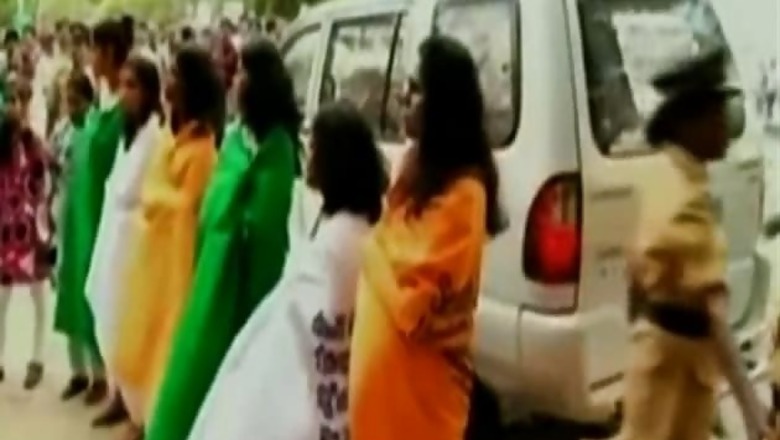
views
New Delhi: The rape and hanging of two young girls at Badaun in Uttar Pradesh has failed to generate widespread protests and sympathy across India. There have been some protests and candlelight marches, but it is nothing compared to the 'Nirbhaya' incident of Delhi.
In distant Kerala, a group of women created a furore when they stood in public, wrapped in banners with anti-rape messages on them. According to a report in 'Global Voices' a group of women, angry over the fact that nothing has been done yet, held a protest in Ernakulam in Kerala, covering themselves with banners that were in tri-colours symbolising the Indian flag. The 'sthreekoottayma' group that consisted of a small group of women arranged this protest event.
People in Kerala were shocked to see women protesting by standing in the open, wrapped in banners that left their shoulders and legs bare. Unfortunately, instead of mobilising large-scale support for the case of the Dalit teenage girls, this unique act of protest was what caught eyeballs and was widely talked about. The police even arrested the protestors for indecent exposure.
Thasni Banu, who took part in the protest had this to explain. "We used our bodies to protest against people who are using women's bodies as a political weapon. Without hearing our voices of protests and slogans, without understanding the apolitical climate which is permeating in the society, people are more worried about our bare shoulders and legs. To those people who still think female bodies are the reason for rape, we mock all those people, in the name of those girls who were raped and lynched in Uttar Pradesh."
Above all this, the way the Kerala government took action against the protestors was in fact strange and shocking. The activists are questioning the government action.
TT Sreekumar, a professional, said, "The cases slapped against the women who took part in the protest for the Dalit teenagers are absurd and inhumane. This should be retracted as soon as possible. Why didn't the police slap cases against the people who were in fact attacking these women who were protesting democratically? The government has taken a non valid stance politically or technically. The women didn't do streaking which is unlawful in India nor did they do anything undemocratic. When women in Manipur protested using their bodies against the military atrocities of the Indian Government, no arrests were done. Then what happened now? When the whole arrest episode is unlawful why is the government terrorising the society? Why are these women pulled into police stations and courts? This cannot be agreed to at all. Retract the cases immediately."
No tears for victims from villages and lower class
A rape is a rape and the social status of the victim should not be a yardstick to support the victim. But, most of the media and social activists ignore the incidents that take place in the far away villages of India. Even in cities, if the victims are from lower class or slum areas, there will be no public outrage. In most cases it will be treated like a routine law and order problem and the newspapers push such stories to inside pages. The TV channels don't even bother to cover them.
After the brutal rape and murder of Delhi braveheart in December 2012, the same questions were asked. Many felt that since the incident took place in South Delhi, it got so much attention.
While justifying the attention it received, many argued that the country should express the same outrage over all such incidents. A blogger writes, "We are a society that is still deeply feudal, specially in rural India. Equality is a myth, and women, unless from a prominent family or economically strong, are "fair game" for powerful men. At the receiving end are the economically weaker and SC/ST / OBC. Soon after the Nirbhaya case another rape was reported from Punjab where the rapist was a rich landlord and politically connected person. He sexually abused a Dalit girl for over a month and the local police refused to even register a case. The girl finally committed suicide. This is by no means an isolated or rare case. This predatory sexual aspect of rich landowners was also depicted by Shyam Benegal in his movie Ankur. This feudal outlook is seen as long back as the Kamasutra which says 'But the practice of Kama with women of the lower castes, with women excommunicated from their own caste, with public women, and with women twice married, is neither enjoined nor prohibited. The object of practicing Kama with such women is pleasure only.' So in dealing with rape we are dealing with some pretty old prejudices."
According to the National Crime Records Bureau (NCRB), registered rape cases in India had increased by almost 900 per cent over the past 40 years. Sadly, only a few rapes lead to public outrage. In India, like many other nations, 'some rapes are more important than the other rapes'. A sad reality.




















Comments
0 comment